China embraces legacy of Deng Xiaoping
| Contributions |
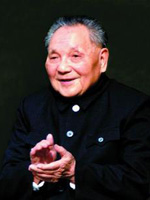 | August 22, 1904 - Febuary 19, 1997 |
Honored as the chief architect behind the reform and opening-up policy, Deng has been acknowledged as the core of the second generation of central leadership that led China out of chaotic political movements and into unprecedented prosperity. | |
| 1977: Chinese government resumed the gaokao (national college entrance examinations). | |
| 1978: China embarked on a drive of reform and opening-up, which has remained a key feature of the country's development ever since. | |
| 1980s: Put forward the “One Country, Two Systems” policy in preparation of Hong Kong’s return to China. | |
| 1992: From January 18 to February 21, Deng toured southern cities including Wuchang, Shenzhen, Zhuhai and Shanghai to deliver a series of landmark speeches that set the tone for China's further reform and opening-up, and ended long-term debates over capitalism and socialism. | |
| Views on Deng Xiaoping |
Some have argued that Deng's achievements have been overstated, as many conservatives who idolize the Mao era blame him for introducing capitalism into China. While some praise his decision to trim the bloated army, some say he neglected to research and develop military weapons. Some even claimed that due to his decision to "shelve disputes" in diplomatic relations, the country missed the best chances to solve maritime disputes.
While some cheered for Deng's dissolution of the cult of personality, others questioned his centralized power and the role he played in the political incidents of the late 1980s.
●Chinese president Xi Jinping:
Xi said the most important political and theoretical legacy of the late Chinese leader is socialism with Chinese characteristics, which the Party and people created under the leadership of Deng Xiaoping.
Xi also praised Deng's bravery and innovation as the late leader's most distinctive characteristics.
●Ezra Vogel, author of Deng Xiaoping and the Transformation of China:
Vogel argued that power centralization is reasonable for China.
"China's so big and complicated with such a long history. If the leadership is too weak and fragmented, it will be hard for the central government to control local officials and it would lead the country to chaos," Vogel told the Shanghai-based Wenhui Daily.
●Wu Ziniu, director of a TV drama about Deng Xiaoping:
"Many people, including myself, witnessed that period of history and are beneficiaries of Deng's policies. Without Deng's revival of education and science, my life would be unimaginable and so would be the life of many of my peers."
He said that young people, especially those who were born after the 1980s, should learn more about Deng's legacy.
●Zhang Yi, 37, a resident from Yuechi county, Guang'an, Sichuan Province:
"I personally am very grateful to Deng. Thanks to him, several highways and bullet trains stop here. Compared with my childhood, life here today has progressed greatly."
| Xi: Strongman like Deng |
Recently, some people commented that President Xi is "the most transformational Chinese leader" and "most powerful" since Deng, and predicted that he will become a leader as assertive and progressive as Deng.
●Leadership:
"Xi is acting more seemingly boldly than previous leaders because he has to," Kerry Brown, professor of Chinese Politics, University of Sydney, told the Global Times.
"The achievements Xi has made in past year indicate that he has the boldness to break the pattern and drive ahead the reform. The times may make him a strongman like Deng," said Wang Changjiang of the Party School of the CPC Central Committee in a report by ifeng.com.
●Ruling environment:
When comparing the situations faced by Xi and Deng, Brown said the challenges for Xi are even greater, but Vogel disagrees, saying that the barriers Deng faced were much greater. At Deng's time of transition, the country was poor and divided, and many people were afraid of changes, he said.
But Vogel admits that the days are gone when one person could make the final decision. Now things are more complicated in the leadership.
"The choice for Deng was relatively easy in some ways. He said it himself: Reform or die," Brown said. "For Xi, the issue now is that there are a range of options so it is more complex. It is not a question of where to reform but how and in what way, at what speed."
●Learn a lesson from Deng:
Vogel said the current Chinese leadership should learn lessons from Deng's era.
"Some of Deng's procedures were appropriate at that time but no longer appropriate now," said Vogel. "The rule of law compared to rule of individualism is more important in the new conditions."
But he suggested the present leadership should learn from Deng's era to keep China's low profile and good relations with other countries.
| Media comments |
| people.com.cn: Deepening the reform is the best way to commemorate Deng Xiaoping |
| Commemoration is for better progress. When China is met with differences, trouble, or even stagnation regarding reforms, we should seek encouragement from the spirit of Deng Xiaoping, the initiator of China’s reform. Deepening reforms is the best way to commemorate Deng. |
| Global Times(Chinese Edition): Deng Xiaoping is a great politician in world’s views |
| It is a common-held view in global media that Deng Xiaoping is a great politician. Over the past half century, many leaders were respected in their own country but criticized abroad due to the cold war and zero-sum politics. However, even those individuals that hold unfriendly views of China admit that Deng Xiaoping is a great man for China’s reform and opening up. |
| Xinhua: Chinese reflect on reforms ahead of Deng's birthday |
| Since the transformation drive led by Deng Xiaoping in late 1978, China has experienced rapid change, replacing a planned economy with a market-oriented one, and an agricultural society with an urban, industrialized one. China's rise over the past three decades is widely acknowledged as the most impressive burst of economic development ever seen. |
| Caixin: The best way to honour Deng Xiaoping |
| Chinese leaders today should finish what was started. Leaders of the 18th Central Committee have rolled out a slate of reforms and begun a corruption crackdown unprecedented in its toughness. Next, they must build a framework for the rule of law. |
| Commemoration |
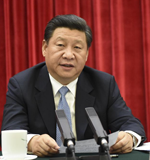 | Chinese leaders commemorate Deng Xiaoping's birth anniversary Chinese President Xi Jinping addressed a symposium on August 20 morning to mark the upcoming 110th anniversary of the birth of late Chinese leader Deng Xiaoping, which falls on August 22. |
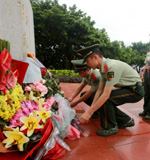 | Guangdong symposium commemorates Deng Xiaoping A symposium was held on August 16 in Guangzhou, capital of South China's Guangdong Province, to commemorate late Chinese leader Deng Xiaoping ahead of his 110th birthday. |
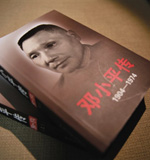 | China publishes official biography of Deng Xiaoping China has published the official biography and collected works of late leader Deng Xiaoping ahead of the 110th anniversary of his birth on August 22. |
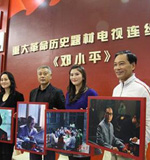 | TV drama touches on sensitive past, honors Deng Xiaoping A new TV series featuring China's late leader Deng Xiaoping has grabbed public attention after its portrayal of politically sensitive figures and events rarely seen on screen. |
| Related Reports |
As 110th anniversary of Deng’s birth approaches, echoes of history emerge
Southern Tour Legency
Web editor: yangruoyu@globaltimes.com.cn